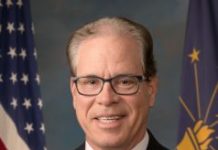 State Fair, healthcare lawsuit, legal defenses dominated work of AG’s Office
State Fair, healthcare lawsuit, legal defenses dominated work of AG’s Office
INDIANAPOLIS – Looking back on his third year in office, Indiana Attorney General Greg Zoeller said state sovereignty emerged as the theme that interconnected the high-profile cases the Attorney General’s office worked on in 2011.
“Though it’s a term many people haven’t heard since their 12th-grade high school civics class, state sovereignty is a living concept at the heart of the work we do every day at the Attorney General’s Office on behalf of the public. When we defend the public treasury from lawsuits or defend state government’s ability to pass and enact its own laws and not have them overridden by the federal government, that is state sovereignty in action,” Zoeller said.
The Indiana Attorney General’s Office protects crime victims by representing the prosecution in criminal appeals and operates the state’s Consumer Protection Division and Unclaimed Property Division. But the Attorney General’s role as the lawyer for the State of Indiana and its citizens via their state elected officials came into the forefront over the past 12 months through several high-profile cases, Zoeller said during a year-end news conference today.
Indiana State Fair Tragedy
The Attorney General’s Office administers the Indiana Tort Claim Fund, which is made up of tax dollars. After the August 13 stage rigging collapse at the Indiana State Fair in which seven people died and many were injured, Zoeller decided to offer the maximum amount in settlement money available in the tort claim fund – $5 million per incident – and divide it among the estates of the deceased and the most seriously injured victims as fairly and equitably as possible. Nationally known victim compensation expert Kenneth Feinberg donated his time in assisting the Attorney General’s Office in designing the compensation protocol. By accepting settlements, claimants agree to not sue state government.
“In our legal system, the people – the citizens of Indiana – ultimately are ‘the sovereign,’ and they are not responsible for the State Fair tragedy. By law we have only $5 million available, and it was in the interest of justice to expeditiously settle the State Fair victims’ claims and pay the entire amount, as a matter of public policy, by year’s end irrespective of liability,†Zoeller said, noting 64 claimants accepted the State’s settlement offers.
Health Care Legal Challenge
Indiana, represented by Zoeller’s office, is one of 26 states that filed a legal challenge to the new federal health care law in 2010. The lawsuit alleges two components of the new law are unconstitutional: the individual mandate requiring Americans to buy health insurance or pay a penalty and the federally mandated expansion of state Medicaid programs. The United States Supreme Court agreed to hear the case and scheduled three days of oral arguments March 26 to 28, 2012; it is likely to rule by June.
“When we joined this legal challenge there were those who claimed this was a frivolous lawsuit. The fact that the U.S. Supreme Court has accepted this appeal, for three days of oral argument, indicates this is a landmark case, involving an unprecedented assertion of federal authority over the sovereignty of states,†Zoeller said. The Attorney General’s Office has spent no additional funds on legal fees or costs beyond its normal budget to participate in the multistate legal challenge, he said.
Defending State Statutes
Just as the Attorney General’s Office represents the State as plaintiff’s attorney in the legal challenge to the federal health care law, the AG’s Office also represents the State as defense attorney when private plaintiffs file legal challenges to state laws, as happened in 2011:
• House Enrolled Act 1210 is a new state law the Legislature passed that prohibited state contracts with or Medicaid funding for abortion providers. Planned Parenthood sued to overturn the law. In defending the statute which now is under a trial court’s preliminary injunction, Zoeller’s office appealed to the U.S. 7th Circuit Court of Appeals. Contending the funding dispute should be between the State and federal government and not between a private medical provider and the State, Zoeller’s office also filed an administrative appeal with a federal agency, the Centers for Medicare and Medicaid Services. Both appeals await rulings.
• Senate Enrolled Act 590 is Indiana’s new law that would allow state and local police to arrest illegal immigrants on federal immigration court orders and also prohibit using foreign consular identification as state ID. The Attorney General’s Office is defending SEA 590 from two separate legal challenges filed by ACLU and an East Chicago nonprofit. Zoeller asked a federal court to join the federal government into the ACLU case as a party to the legal challenge. More recently Zoeller has requested the ACLU case be stayed, or placed on hold temporarily, until the U.S. Supreme Court rules on a related challenge to Arizona’s state immigration law.
• House Enrolled Act 1003 allows the State to provide “choice scholarships,†or vouchers, to parents to enroll their children in private schools. Zoeller’s office has defended the statute from a legal challenge to its constitutionality. Approximately 3,900 students are attending private schools this year using choice scholarships.
Defending Telephone Privacy
Zoeller has had to fend off multiple threats to Indiana’s popular telephone privacy protections, including the state statute that prohibits auto-dialed “robo-calls†placed without the consumer’s permission. Zoeller’s office defended the Indiana auto-dialer ban from a legal challenge brought by an Illinois political advocacy group. When a federal court injunction blocked enforcement of the law, Zoeller appealed to the 7th Circuit and won a stay of the injunction during the appeal. Separately, Zoeller in November testified in Congress against a bill that would block states from enforcing state laws restricting robo-calls; he and attorneys general of all the other states decried the congressional bill as an attack on cell-phone consumers’ privacy. Because of the vocal opposition, the bill was recently withdrawn from consideration in the U.S. House.
Defending State Government
As the State’s lawyer, the Attorney General provides legal advice to state government officials and represents state government entities and county prosecutors named in lawsuits. Beyond the day-to-day work representing state agencies in court, Zoeller’s office is participating as an amicus curiae (friend of the court) in an appeal of a court order, now stayed, that required the Governor to testify in a civil suit. The Attorney General’s Office also represents the Indiana Recount Commission in the appeal of a trial court’s ruling reversing the commission’s decision in a ballot-eligibility case. “We don’t make public policy for other state agencies; but when they are sued, like any client they are entitled to diligent legal representation. In defending the sovereignty of the State of Indiana, we vigorously represent the interests of our agency clients but ultimately we represent the public’s interest and act on Hoosiers’ behalf,†Zoeller said.
Zoeller noted that the 144 lawyers in the Attorney General’s Office have performed the duties of protecting consumers, defending state entities and state statutes while operating within a $23 million agency budget.
Zoeller is closing in on nearly 11 years spent with the Indiana Attorney General’s Office – the first eight years as chief deputy AG to former Attorney General Steve Carter from 2001 to 2008. Zoeller was elected Indiana’s 42nd attorney general in 2008 and took office in January 2009. A New Albany, Ind., native who earned his law degree at Indiana University School of Law – Bloomington, Zoeller worked for 10 years as an executive assistant to Dan Quayle, first in Quayle’s U.S. Senate office and then in the U.S. Vice President’s office. Zoeller was in private practice for a decade before joining state government in 2001. As Attorney General he has focused on protection of crime victims through winning appeals and protecting consumers through investigating and shutting down scams. Zoeller also organizes an annual competition among lawyers and law firms called “March Against Hunger†that has raised tons of food donations for regional food banks.




